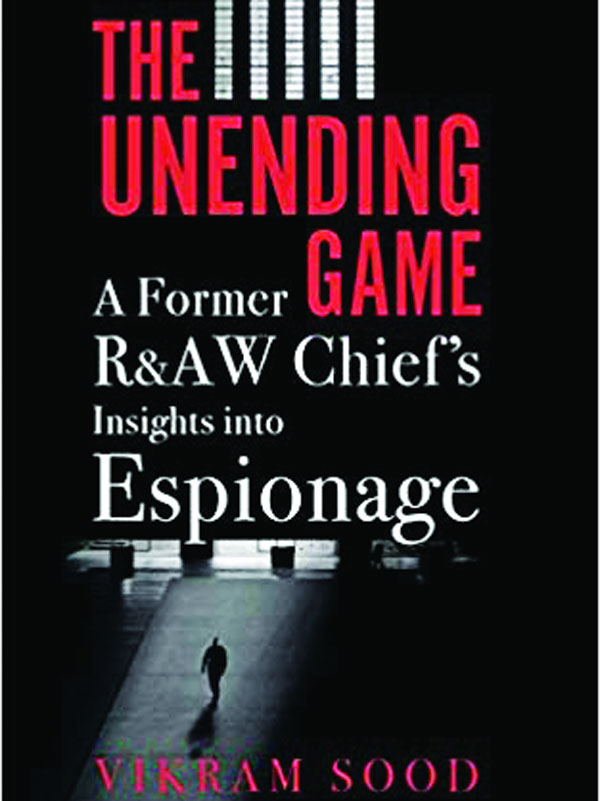The Unending Game
Author - Vikram Sood
Publisher- Penguin, Rs 599
Vikram Sood’s book throws light on the history of espionage in India, writes GAUTAM MUKHERJEE
Intelligence gathering these days is not all careful-not-to-squeak “gum shoeâ€. The old style “private detectiveâ€, overcoat and hat pulled down low over the brow, has acquired a lot of supplementaries. The two world wars ushered in the breaking of secret-code ciphers, and monitoring of Ham Radio frequencies. Spying became as much an HQ expert feature as the agent in the field.
Speed is of the essence now to thwart threats, increasingly from terrorism with a nuclear overhang. The tools at hand have multiplied. There is HUMINT — Human Intelligence; received from both trans-border and undercover resources, and still, in 2018, probably the best way for qualified professionals good at finding nuggets amongst “unprocessed intelligenceâ€. There is also OSINT — that which comes through third countries who have access to target countries. TECHINT, meaning technical intelligence gathered from snooping devices, voice transcripts, recordings, and increasingly the social media. There is satellite and photo surveillance/reconnaissance — IMINT. COMINT — from monitoring communications and conversations. ELINT — radar and electronic intelligence-intercepts, decrypted cipher messages, topographical information.
Is there just too much information being generated to afford timely analysis? The author of this book, Vikram Sood, former R&AW (Research and Analysis Wing) Chief who retired in 2003 after 31 years in intelligence, thinks it is best suited to developing and executing medium to long-term strategies. This book, written in a rich anecdotal style, certainly affords an insight, particularly on the operability of the process in a democracy.
Intelligence plays a more inward-looking and repressive role in totalitarian regimes and dictatorships. The history of organisations such as the KGB (Komitet Gosudarstvennoy Bezopasnosti) in the erstwhile USSR (Union of Soviet Socialist Republics), the STASI (State Security or State Security Service) in the former East Germany, SAVAK in pre-revolutionary Iran, Egypt’s Mukhabarat, all point to “the midnight knock†purpose of intelligence gathering. “Enemies of the Stateâ€, a code phrase for dissidence, had such unfortunates jailed, tortured and eliminated.
In terms of international espionage, the most extensive and well-funded is certainly the CIA (Central Intelligence Agency). Other admired and dreaded Intelligence organizations such as Israel’s Mossad and Pakistan’s ISI (Inter-Services Intelligence) are partially CIA trained. Of course, the fanatical dedication to ideology and country, observed in the Mossad and ISI, make them much harder to infiltrate.
In India, the true mother of external intelligence was Prime Minister Indira Gandhi and her legendary R&AW Chief RN Kao. Subsequent administrations took a less supportive view, making for neglect, stagnation and stunting. Prime Minister Morarji Desai actively cut R&AW down-to-size. Prime Minister Rajiv Gandhi revived its fortunes somewhat; even as Prime Minister PV Narasimha Rao more or less ignored it.
Prime Minister Narendra Modi has a healthy respect for intelligence and has demonstrated it with the prominence given to the National Security Adviser, Ajit Doval, a former spy himself. PM Modi has gone out of his way to arrange for international intelligence sharing particularly to prevent Islamic terrorism and economic offences and absconders. Intelligence, it appears, is almost invariably run from the top echelons of the political pile. Vikram Sood’s book takes the reader on a tour of the world’s intelligence services and their modus operandi, using an elegant prose to do it.
For example, Sood describes the American collaboration with the Pakistanis in his chapter on the ‘Asian Playing Fields’: “Apart from the money generated by the Americans and the Saudis, opium cultivation in Afghanistan and the processing of opium into heroin in Pakistan was encouraged to finance the war…. By 1990 the region accounted for 70 per cent of the total global production….The CIA would deliver weapons at Karachi and the ISI would carry them inland in their transport company, the National Logistics Cell. The vehicles on their return to Karachi from the NWFP would carry processed heroin for global shipment.†Other stringent American laws crack down on drugs, but so what?
The Soviets were no slouches in the espionage game either. In the days of the Cold War, they put money and effort into India to try and expose “the CIA handâ€. The much talked about second volume of the Mitrokhin papers has nearly 17,000 stories planted in the Indian media between 1972 and 1975. But of course, as India has changed and grown into an emerging economic power, and the USSR has collapsed into history, the chess pieces have had to be rearranged. The Chinese too have become increasingly important players in the world intelligence community.
According to Sood: “They freely use diplomatic cover in missions abroad, deploy their defence attachés and use journalists.†They also infiltrate academia, defence manufacturers and even the CIA itself, using their ethnic Chinese employees whose sympathies can be aroused. Chinese Intelligence sponsors a number of think tanks in China via its Ministry of State Security (MSS), most useful in reciprocal interchanges with other think tanks and in the ever popular “Track II Diplomacyâ€. Since everything is state owned, however, all roads in China do lead to Beijing. Vikram Sood narrates tale after tale of string-pulling and shadow-boxing around the rich and influential secret societies of the world, with profound effects on the future course of events.
The reviewer is an entrepreneur and former corporate executive


























